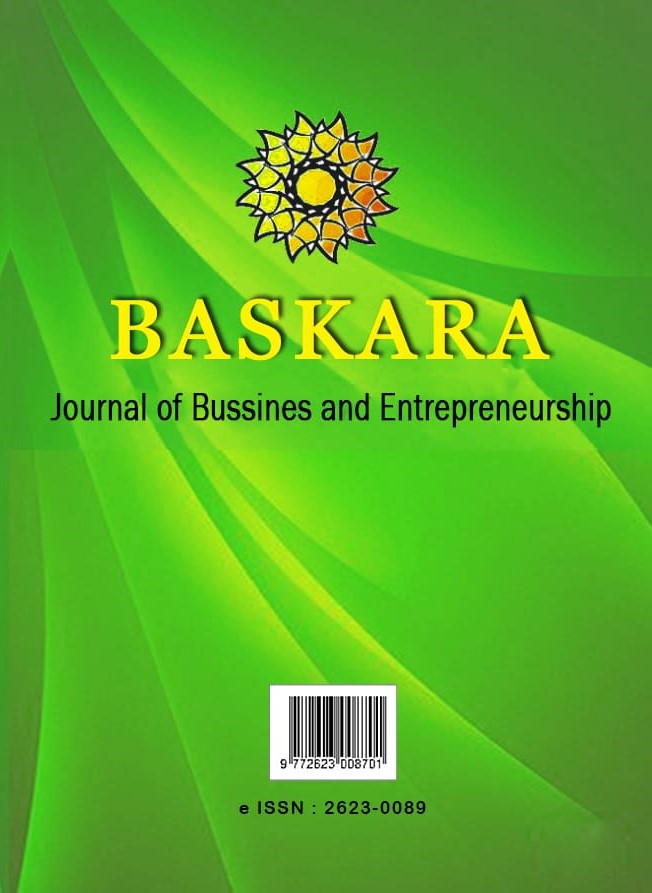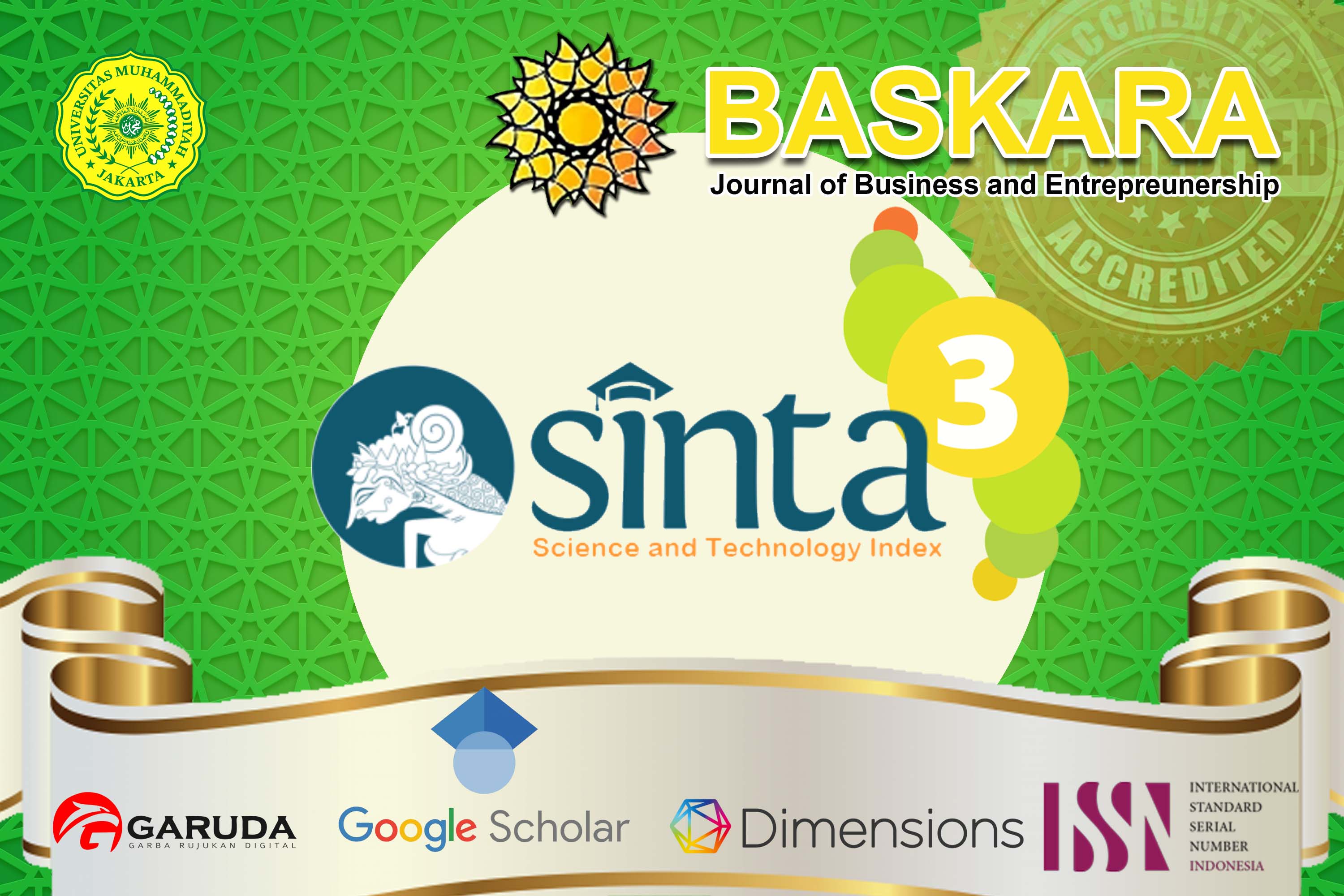Local Knowledge as the Basis of Innovation in Managing Agricultural Products
DOI:
https://doi.org/10.54268/baskara.v5i2.14086Keywords:
Local knowledge, agriculture produce, post-COVID-19, food productAbstract
The management of agricultural resources is an important agenda especially during the period of COVID-19 pandemic, which has increased food waste from agricultural products and the loss of sources of income among communities involved in agricultural activities. However, food waste remains as an urgent matter even in post-COVID-19 pandemic. This article aims to discuss about how local knowledge is used to deal with the agriculture waste. Vegetables dumping issues causing waste and affecting the income of farmers and vegetable sellers. Therefore, innovations in processing vegetables into processed food was implemented to optimize agribussines values. In achieving this goal, the steps to be taken are to empower the existing knowledge so called ‘local knowledge’. The information in producing this article was gathered through observation of community who participate voluntarily and interviews with Department of Agriculture, Federal Agricultural Marketing Authority (FAMA) and The Ministry of Agriculture and Food Industries and abbreviated (MAFI). The results of the study found that the main methods of food processing method by the community are preserving, drying, smoking or curing and frying. Hence this these methods were used to process cabbage (Brassica oleracea) into several products namely (1) cabbage floss, (2) salted cabbage, (4) cabbage bosou and (4) cabbage kimchi.References
Adam, N. A. & Alarifi, G. (2021). Innovation Practices for Survival of Small and Medium Enterprises in the COVID-19 Times: The Role of External Support. Journal of Innovation and Entrepreneurship, 10(1), 15. https://doi.org/10.1186/s13731-021-00156-6.
Aulia, Muhammad Reza, Saragi, Cyprianus PH & Simbolon, Ramses. (2021). The Effect of Entrepreneurial Competence and Entrepreneurial Competence on Business Performance of Micro and Small-Scale Coffee Shops in Bogor. BASKARA: Journal of Business and Entrepreneurship, 4(1), 37-48. http://dx.doi.org/10.54268/baskara.4.1.37-48.
Foo, Jurry. (2020). Inovasi Sosial Melalui Bengkel Mengoptimumkan Kearifan Tempatan Menentang Penularan Covid19. Borneo Daily Bulletin. April 26. From https://www.borneodailybulletin.com/inovasi-sosial-melalui-bengkel-mengoptimumkan-kearifan-tempatan-menentang-penularan-covid19/.
Hendrayati, Silvia & Nurauliya, Vina. (2021). Building Competitive Advantage through Innovation, Creativity, Product Quality. BASKARA: Journal of Business and Entrepreneurship, 4(1), 85-94. https://doi.org/10.54268/baskara.4.1.85-94.
Ismail, Marwan, Fernandez, Kevin, Musa, Nik Yusri & Nawi, Noorhisyam Md. (2017). Inovasi Sosial Dalam Program Pembangunan Komuniti NGO-Berkebajikan Melayu Islam Di Malaysia. Proceedings of the International Conference on Human Sustainability 2017 (INSAN2017) Ayer Keroh, Malacca, Malaysia, 1– 2 November.
Komoo, Ibrahim. (2015). Meraikan Inovasi Sosial. From https://ibrahimkomoo.com/2015/07/27/meraikan-inovasi-sosial/.
Noer, Khaerul Umam. (2021). From Villages to World Markets: Women and E-Commerce in East Sumba, East Nusa Tenggara. BASKARA: Journal of Business and Entrepreneurship, 4(1), 63-72. http://dx.doi.org/10.54268/baskara.4.1.63-71.
Othman, Mumtazah. (2011). Penggunaan Lestari: Konsep dan Pengenalan. In Mumtaz Othman & Nurizan Yahaya (Eds.) Penggunaan Lestari. Bagaimana Tingkah laku Remaja? 1-11. Serdang: Universiti Putra Malaysia.
Rostam, Katiman & Ahmad, Asmah. (2006). Penilaian dan Pengurusan Sumber Alam. Bangi: Universiti Kebangsaan Malaysia.
Salleh, Mohd Yusry Yusof & Ramli, Mohd Anuar. (2020). Pentakrifan Kearifan Tempatan: Suatu Sorotan. Jurnal Melayu, 19(2), 175-188. http://ejournal.ukm.my/jmelayu/issue/view/1344.
Schachter, M. E. (2018). The Nature and Variety of Innovation. International Journal of Innovation Studies, 2(2), 65-79. https://doi.org/10.1016/j.ijis.2018.08.004
Sintian, Minah, Taisin, Julita@Norjietta, Omar, Ani & Tajuddin, Siti Nor Amalina Ahmad. (2018). Kearifan Lokal Masyarakat Kadazandusun dalam Pertanian Membantu Pelestarian Alam. E-Prosiding Persidangan Antarabangsa Sains Sosial dan Kemanusiaan. From http://conference.kuis.edu.my/pasak3/images/eprosiding1/PASAK3_1110.pdf
UNESCO. (2021). Local and Indigenous Knowledge Systems (LINKS). From https://en.unesco.org/links.
Downloads
Published
Issue
Section
License
In order for Baskara: Journal of Business and Entrepreneurship to publish and disseminate research articles, we need publishing rights (transfered from author(s) to publisher). This is determined by a publishing agreement between the Author(s) and Baskara Journal. This agreement deals with the transfer or license of the copyright of publishing to Baskara: Journal of Business and Entrepreneurship, while Authors still retain significant rights to use and share their own published articles. Baskara : Journal of Business and Entrepreneurship supports the need for authors to share, disseminate and maximize the impact of their research and these rights, in any databases.
As a journal Author, you have rights for a large range of uses of your article, including use by your employing institute or company. These Author rights can be exercised without the need to obtain specific permission. Authors publishing in Baskara : Journal of Business and Entrepreneurship have wide rights to use their works for teaching and scholarly purposes without needing to seek permission, including:
- use for classroom teaching by Author or Author's institution and presentation at a meeting or conference and distributing copies to attendees;
- use for internal training by author's company;
- distribution to colleagues for their reseearch use;
- use in a subsequent compilation of the author's works;
- inclusion in a thesis or dissertation;
- reuse of portions or extracts from the article in other works (with full acknowledgement of final article);
- preparation of derivative works (other than commercial purposes) (with full acknowledgement of final article);
- voluntary posting on open web sites operated by author or author’s institution for scholarly purposes.
Copyright Transfer Agreement for Publishing (Publishing Right)
The Authors who submit manuscript has to understand that if accepted for publication, mean that all copyright and publishing right of the article shall be assigned/transferred to Baskara: Journal of Business and Entrepreneurship as assigned publisher.
- CC BY-NC: This license allows reusers to distribute, remix, adapt, and build upon the material in any medium or format for noncommercial purposes only, and only so long as attribution is given to the creator.
It includes the following elements:
BY ![]() – Credit must be given to the creator
– Credit must be given to the creator
NC ![]() – Only noncommercial uses of the work are permitted
– Only noncommercial uses of the work are permitted
Baskara (C) Copyright (2022):
BASKARA: Journal of Business and Entrepreneurship by https://jurnal.umj.ac.id/index.php/baskara
is licensed under a Creative Commons Attribution-NonCommercial 4.0 International License








